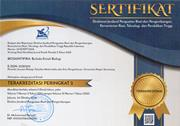The Content of Chlorophyll, and Antioxidant Activity of Malabar plum (Syzygium jambos) Leaves at Different Developmental Stages
(1) Biology Department, Faculty of Science and Mathematics, Diponegoro University
(2) Biology Department, Faculty of Science and Mathematics, Diponegoro University
(3) Biology Department, Faculty of Science and Mathematics, Diponegoro University
Abstract
Malabar plum [Syzygium jambos (L.) Alston.] is a tropical plant which is used as a medicinal plant, because it contains secondary metabolites, especially in the leaves. The different leaves developmental stages can affect physiological changes, especially metabolic processes, so it is suspected to affect the antioxidant content and activity. The objective of this research was to study the difference of leaves morphology, chlorophyll contents, antioxidant contents, and activity at the different leaves developmental stages. Samples were taken from Kaliboto Village, Purworejo, Central Java. The leaf color measurement was using colorimetry; determination of chlorophyll, carotenoids, ascorbic acid, and total phenol content is was using spectrophotometry; and antioxidant activity was using the 1,1-diphenyl-2-picrylhydrazyl (DPPH) method. Qualitative data were analyzed descriptively, while quantitative data were analyzed by ANOVA tests. The results showed that the higher level of leaves development, the higher pigment content, total phenol, and antioxidant activity ascorbic acid content in the mature leaves is lower when compared to the young and old leaves. The results of this research provide the information that can support the use of Malabar plum leaves in traditional medicinal activity and pharmaceutical industry, as well as basic information for plant breeding.
Keywords
Full Text:
PDFRefbacks
- There are currently no refbacks.

This work is licensed under a Creative Commons Attribution 4.0 International License.



